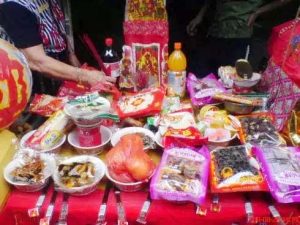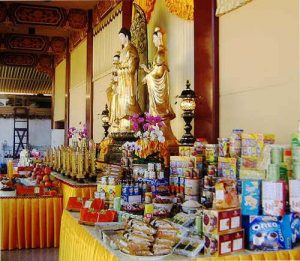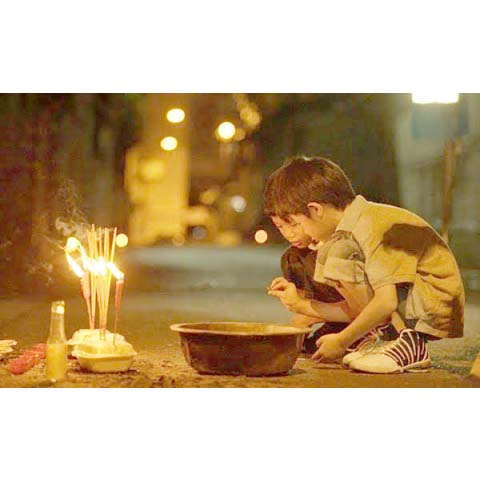
In Chinese culture, the 15th day of the seventh month (七月半) in the lunar calendar is Ghost Day and the seventh month in general is regarded as the Ghost Month (鬼月). During this period, it is believed that the gates of hell are opened to allow the spirits in hell, or ghosts from its lowest realm as well as other restless spirits, to roam among the living. The gates of heaven are opened as well, enabling benign spirits to visit their family for feasting.
In the Philippines, food offering for all the ghosts (敬好兄弟) and guardians of the vicinity of our home (敬地主) is observed 10 days before or after the Ghost Day. Offering for the ancestors (敬公媽) is observed on Ghost Day itself.
This year, the first day of the seventh lunar month falls on Aug. 22. Offerings to the hungry ghosts will start from Aug. 26 to Sept. 15, with Sept. 5 (the 15th lunar day) being the Ghost Day. The festival ends on Sept. 19.
The Chinese formal name for Ghost Month is Zhongyuan Festival (中元節). It is also called Yu Lan (盂蘭節) or Festival of the Hungry Ghost, so named because after two weeks of wandering the earth, the ghosts are weary and ravenous, so it’s especially important on this day to keep them appeased.
Ghost Festival is distinct from the Qingming Festival (清明節) or Tomb Sweeping Day, the equivalent to All Saints’ Day, wherein living descendants pay homage to their deceased ancestors. By contrast, during Ghost Month, it is the deceased who supposedly visit the living.
Intrinsic to Ghost Month is the veneration of the dead, which includes paying respects to all deceased, including the younger generations, whereas Qingming only venerates the older generations. Both festivals are reminders to observe filial piety.
Paying respects to the deceased during Ghost Month also include “ghosts in limbo” – restless spirits who were not ready to leave earth, or who were not given a proper burial or treated badly by the family after death. These spirits are not offered food, thus referred to as hungry ghosts. Many Chinese families follow both Buddhism and Taoism religions. So, during Ghost Month, both Buddhists and Taoists perform rituals to absolve the sufferings of the dead in hell.
Many Chinese families follow both Buddhism and Taoism religions. So, during Ghost Month, both Buddhists and Taoists perform rituals to absolve the sufferings of the dead in hell.
Other observances include offering food, burning incense and joss paper as offerings to the deceased, and releasing paper boats and lanterns on water. Some prepare elaborate 12-course meals, with empty seats reserved for each deceased member of the family. In other countries, papier-mâché clothes, gold and other fine goods are burned.
For those still in the mourning period for the deceased (新亡, the first two years after death), such offering is made on the 14th day.
Food offerings may include fruits, meat, canned goods, pastries, rice and noodles – practically anything that represents a feast for the ancestors and ensures that other ghosts don’t get hungry or angry. After the ghosts are fed well, paper boats, candles and lanterns are released on water to guide the lost ghosts back to where they came from.
There are certain beliefs that are observed during the entire Ghost Month: people are advised not to get engaged or married, open new businesses, build or move to a new house or in short, pursue new ventures or enterprise.
The more superstitious avoid swimming, surgery, traveling, urinating on trees, taking photos at night or leaving front or back doors open at night. More extreme are couples who opt for Caesarian section to avoid giving birth on Ghost Month.
The Chinese believe it is important to keep the ghosts well fed with offerings outside the home, in order to appease them. Some sprinkle rock salt on the floor outside the front door, as spirits are said to be afraid of it. Lastly, visiting temples or churches to pray for the deceased is also observed.
Although there are several variations regarding the origin of the Ghost Month, over time it has evolved into a period for making offerings to ancestors and to appease malignant spirits walking among them.
The evolution of the Ghost Month dates back more than 2,000 years. In Taoism, the festival falls on the birthday of Lord Qingxu (清虚大帝), the celestial official on earth (地官) who judges the deeds of the living who pray for his forgiveness during the Ghost Month, when he also releases the deceased from their sufferings.
In Buddhism, the festival is associated with Mulian (目連 or Maudgalyayana). His story is depicted in the popular Buddhist tale “Mulian Saves his Mother from Hell (目連救母).”
In Buddhist scripture, there are many realms of hell. Mulian, a virtuous monk, sought Buddha’s help to rescue his mother, who had been condemned to the lowest and most painful purgatory in karmic retribution for her deep and grievous sins. She became a hungry ghost and could not be saved by just divine power alone.
To save her, Mulian was instructed by Buddha to offer food and gifts to monks and monasteries on the 15th day of the seventh lunar month. Mulian followed Buddha’s instructions. His filial piety rescued his mother from her sufferings and she was able to reincarnate to the next life.
Today, similar rituals are held in the Buddhism temples on this day for the deliverance of all suffering spirits.
The Ghost Month was listed in 2011 as part of China’s intangible cultural heritage. In China and Taiwan, businesses normally close down on Ghost Day. In Hong Kong, the occasion has been closely associated with the Chiu Chow community for more than 100 years, with the community hosting celebrations which includes lion dances and Chinese opera performances.
Aside from China, Ghost Month is observed in many Asian countries, including Japan, India, Thailand, Malaysia, Singapore, Vietnam, Laos, Cambodia and the Philippines.
